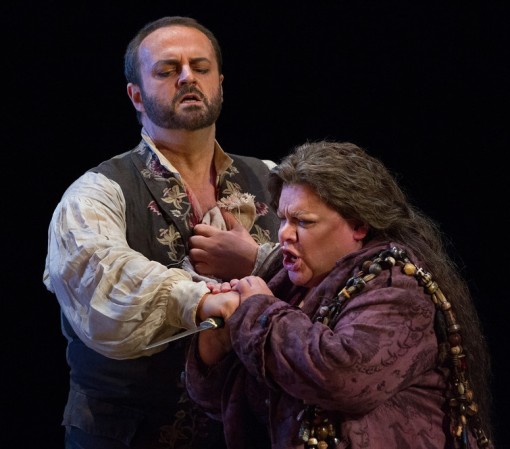Low voices come out on top in Met’s mixed “Trovatore”

Gwyn Hughes-Jones as Manrico and Dolora Zajick as Azucena in Verdi's "Il Trovatore." Photo: Marty Sohl/Metropolitan Opera
David McVicar’s 2009 Metropolitan Opera production of Il trovatore, revived at the house Saturday afternoon, sets Giuseppe Verdi’s opera during Napoléon’s campaign on the Iberian peninsula. The director doubtless sought to create a reasoned frame for the brandished swords and martial rhythms that slice their way through the score, perhaps also to trade on Verdi’s fame as a bard of Italian nationalism. (Spaniards call the Napoleonic conflict “the War of Spanish Independence.”)
One problem with the concept is that Il trovatore is as much about nineteenth-century politics as Tristan und Isolde is about Irish folk-medicine. Like Kaija Saariaho’s troubadour opera L’amour de loin, Il trovatore is a meditation on poetry and song—and a fever-dream in which fire devours all, leaving behind only ashes. Azucena’s mother and child die in the blaze that smolders in her mind. Count di Luna is “aflame” with passion for Leonora. Manrico rushes off to save Azucena from the pyre, and Leonora’s poison is a “terrible fire” eating away at her innards.
The elaborately choreographed fights, historically accurate uniforms, and dreary prison courtyards wrought by the Met’s production team (including set designer Charles Edwards, costume designer Brigitte Reiffenstuel, and choreographer Leah Hausman) approximate Spanish history as depicted by Goya but capture little of the metaphysical mania at the heart of Verdi’s seething opera.
Il trovatore stands or falls on the rapture and poetry summoned by its cast, and by that measure the Met performance can be counted a partial success. It begins and ends with extraordinary voices. Morris Robinson’s first resonant cries of All’erta! send ripples of wonder through the audience. Tall and burly, he dominates the stage as Ferrando, and his firm, opulent tone seems to pour forth from another world. He delivers the captain’s rhythmically elaborate music with more care than most, and while he does sing heavily anglicized Italian, the vocal majesty and theatrical panache he brings to the opera’s opening ghost story—and the fleet whispers of terror it in turn draws from the Met’s superb chorus—get the show off to a thrilling start.
The other standout in the cast is Dolora Zajick as Azucena, who made her company début in the role in 1988. She seems a visitor not from another place but from another time—from, say, Verdi’s time, when singing meant having a command of basic musicianship, including the ability to execute clean trills and fioritura, control dynamics, and maintain an accurate (but pliant) sense of time. Zajick’s tone is solid in all registers and at all volumes, whether reduced to a suffocated thread of sound (as in the final, anguished phrases of Condotta ell’era in ceppi) or unfurled in gleaming, vengeful triumph in the opera’s closing measures. She shapes words with feeling and understanding and portrays Verdi’s shattered gypsy with tormented dignity. Zajick is a sovereign and seemingly ageless artist, but because no earthly things or people last forever, audiences would do well to catch her while they can.
Along with the veteran Zajick, the cast included the company début of Guanqun Yu, stepping in for the indisposed Carmen Giannattasio as Leonora. A graceful figure on stage, Yu has a warm, lustrous voice that is even in all registers, only occasionally sounding underpowered in its lowest reaches. Her pluck and poised, generous singing rightly won grateful ovations; at the same time, she skims her way through Verdi’s florid writing (the breakneck tempo imposed by conductor Daniele Callegari in the Vivra! Contende il giubilo duet doesn’t help matters) and tends to spin phrase after lovely phrase without ever fusing them into a telling whole.
It is a pleasure to hear Franco Vassallo’s pellucid enunciation, long phrases, and admirably free upper register in Il balen del suo sorriso. A pity, then, that he brings more bluster than poetry to the music of the lovesick Count di Luna, and that he addresses his rapturous air not to the moon and the stars but instead stands stage center, eyes fixed on the maestro. (Paula Williams’ stage direction for this revival is uninspired throughout; even the anvil-pounders are fewer and less hunky than in seasons past.)
Gwyn Hughes-Jones brings every virtue to the title role except a honeyed sound. His lean, bright timbre makes him the rare Manrico who is credible as a poet and not only as a warrior. He is a musicianly singer, acting well and shaping Verdi’s music with intelligence and fire, but the stuff of his voice is unremarkable and sometimes bleaty.
Callegari leads an untidy reading of the score, opening up some traditional cuts, rushing the singers through repeats of cabalettas (altogether pointless unless ornamented in accordance with nineteenth-century practice), and wrapping things up in record time, impervious, like much of the Met’s artistic team, to the dark fire that burns its way through Il trovatore.
Il trovatore runs through October 25 and returns January 9-24 with Patricia Racette, Stephanie Blythe, Marco Berti and Alexey Markov. metoperafamily.org; 212-362-6000.
—